LAW 8500 - Analysis of Trusts and Agency in Corporations Law Scenarios
VerifiedAdded on 2023/06/11
|9
|2291
|359
Report
AI Summary
This assignment provides an analysis of trusts and agency within the context of corporations law. It addresses the concept of certainty in creating a trust, referencing cases like Star v Star and Herdegen v Federal Commissioner of Taxation to illustrate the importance of clear intention and subject-matter. The assignment also explores agency relationships, differentiating between actual and apparent authority, and applying these principles to a scenario involving an architect's claim for fees. Cases like Ireland v Livingstone, Watteau v Fenwick, and Freeman & Lockyer v Buckhurst Park Properties are used to support the analysis. The document concludes that the director was acting within her usual authority, making the company liable for the architect's fees. Desklib is a platform where students can find similar solved assignments and study resources.
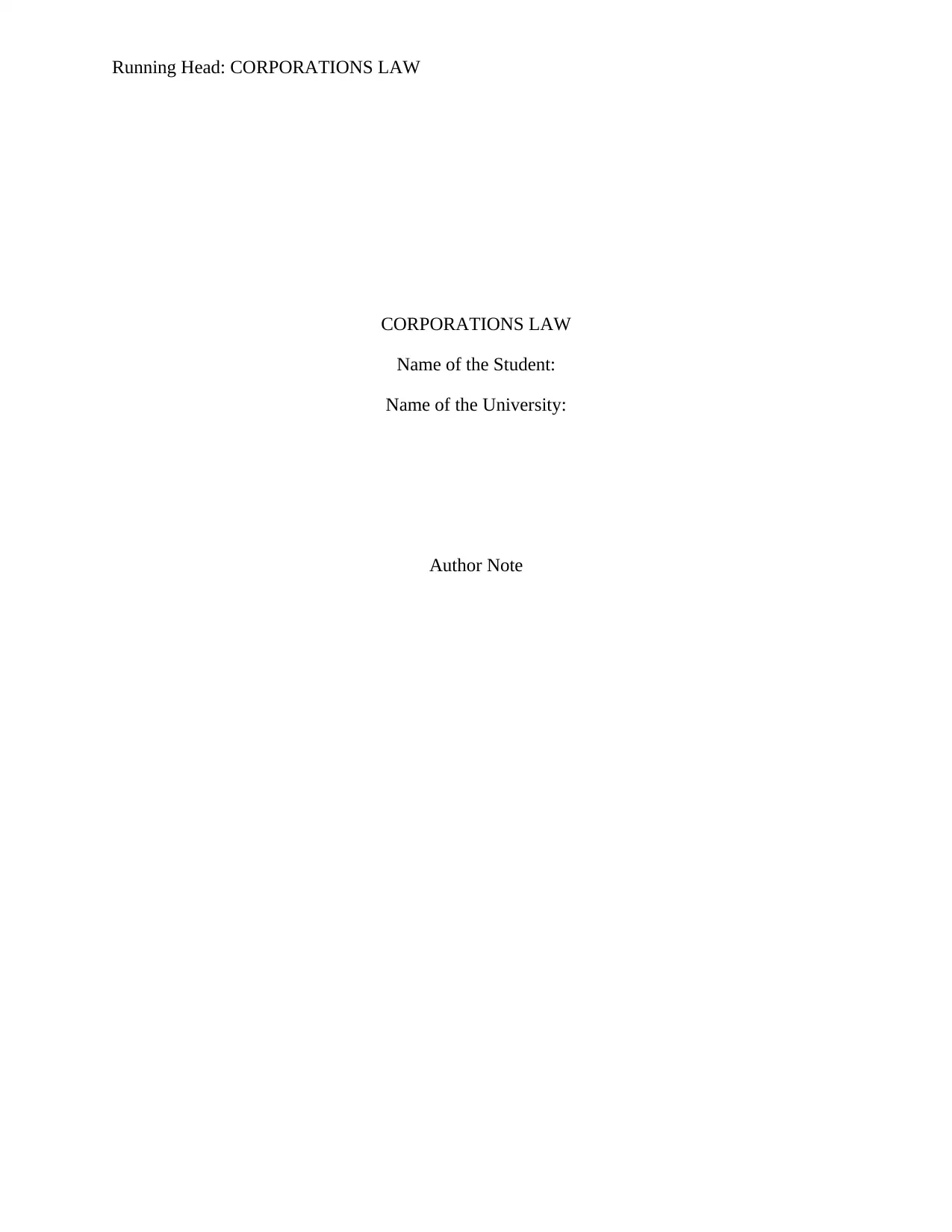
Running Head: CORPORATIONS LAW
CORPORATIONS LAW
Name of the Student:
Name of the University:
Author Note
CORPORATIONS LAW
Name of the Student:
Name of the University:
Author Note
Paraphrase This Document
Need a fresh take? Get an instant paraphrase of this document with our AI Paraphraser
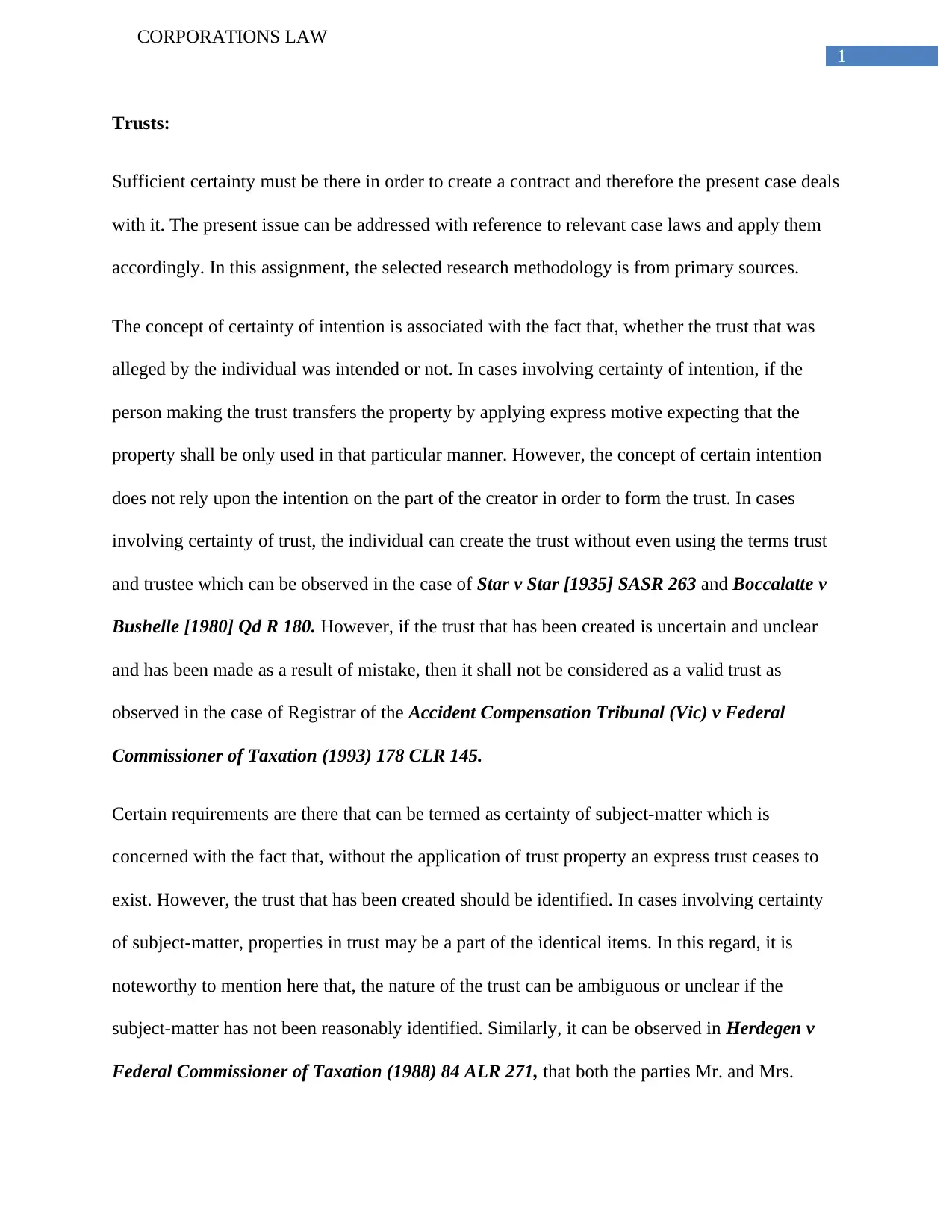
1
CORPORATIONS LAW
Trusts:
Sufficient certainty must be there in order to create a contract and therefore the present case deals
with it. The present issue can be addressed with reference to relevant case laws and apply them
accordingly. In this assignment, the selected research methodology is from primary sources.
The concept of certainty of intention is associated with the fact that, whether the trust that was
alleged by the individual was intended or not. In cases involving certainty of intention, if the
person making the trust transfers the property by applying express motive expecting that the
property shall be only used in that particular manner. However, the concept of certain intention
does not rely upon the intention on the part of the creator in order to form the trust. In cases
involving certainty of trust, the individual can create the trust without even using the terms trust
and trustee which can be observed in the case of Star v Star [1935] SASR 263 and Boccalatte v
Bushelle [1980] Qd R 180. However, if the trust that has been created is uncertain and unclear
and has been made as a result of mistake, then it shall not be considered as a valid trust as
observed in the case of Registrar of the Accident Compensation Tribunal (Vic) v Federal
Commissioner of Taxation (1993) 178 CLR 145.
Certain requirements are there that can be termed as certainty of subject-matter which is
concerned with the fact that, without the application of trust property an express trust ceases to
exist. However, the trust that has been created should be identified. In cases involving certainty
of subject-matter, properties in trust may be a part of the identical items. In this regard, it is
noteworthy to mention here that, the nature of the trust can be ambiguous or unclear if the
subject-matter has not been reasonably identified. Similarly, it can be observed in Herdegen v
Federal Commissioner of Taxation (1988) 84 ALR 271, that both the parties Mr. and Mrs.
CORPORATIONS LAW
Trusts:
Sufficient certainty must be there in order to create a contract and therefore the present case deals
with it. The present issue can be addressed with reference to relevant case laws and apply them
accordingly. In this assignment, the selected research methodology is from primary sources.
The concept of certainty of intention is associated with the fact that, whether the trust that was
alleged by the individual was intended or not. In cases involving certainty of intention, if the
person making the trust transfers the property by applying express motive expecting that the
property shall be only used in that particular manner. However, the concept of certain intention
does not rely upon the intention on the part of the creator in order to form the trust. In cases
involving certainty of trust, the individual can create the trust without even using the terms trust
and trustee which can be observed in the case of Star v Star [1935] SASR 263 and Boccalatte v
Bushelle [1980] Qd R 180. However, if the trust that has been created is uncertain and unclear
and has been made as a result of mistake, then it shall not be considered as a valid trust as
observed in the case of Registrar of the Accident Compensation Tribunal (Vic) v Federal
Commissioner of Taxation (1993) 178 CLR 145.
Certain requirements are there that can be termed as certainty of subject-matter which is
concerned with the fact that, without the application of trust property an express trust ceases to
exist. However, the trust that has been created should be identified. In cases involving certainty
of subject-matter, properties in trust may be a part of the identical items. In this regard, it is
noteworthy to mention here that, the nature of the trust can be ambiguous or unclear if the
subject-matter has not been reasonably identified. Similarly, it can be observed in Herdegen v
Federal Commissioner of Taxation (1988) 84 ALR 271, that both the parties Mr. and Mrs.
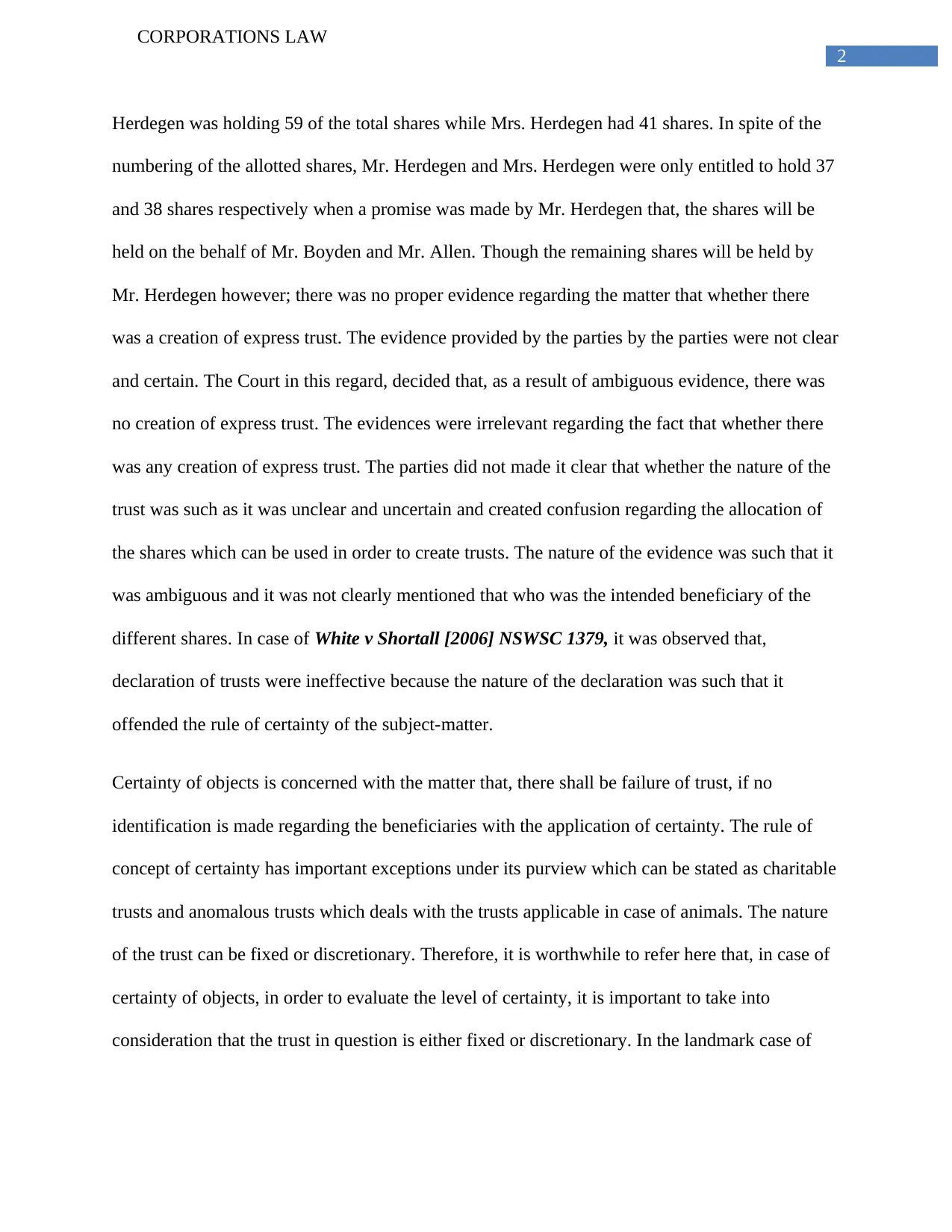
2
CORPORATIONS LAW
Herdegen was holding 59 of the total shares while Mrs. Herdegen had 41 shares. In spite of the
numbering of the allotted shares, Mr. Herdegen and Mrs. Herdegen were only entitled to hold 37
and 38 shares respectively when a promise was made by Mr. Herdegen that, the shares will be
held on the behalf of Mr. Boyden and Mr. Allen. Though the remaining shares will be held by
Mr. Herdegen however; there was no proper evidence regarding the matter that whether there
was a creation of express trust. The evidence provided by the parties by the parties were not clear
and certain. The Court in this regard, decided that, as a result of ambiguous evidence, there was
no creation of express trust. The evidences were irrelevant regarding the fact that whether there
was any creation of express trust. The parties did not made it clear that whether the nature of the
trust was such as it was unclear and uncertain and created confusion regarding the allocation of
the shares which can be used in order to create trusts. The nature of the evidence was such that it
was ambiguous and it was not clearly mentioned that who was the intended beneficiary of the
different shares. In case of White v Shortall [2006] NSWSC 1379, it was observed that,
declaration of trusts were ineffective because the nature of the declaration was such that it
offended the rule of certainty of the subject-matter.
Certainty of objects is concerned with the matter that, there shall be failure of trust, if no
identification is made regarding the beneficiaries with the application of certainty. The rule of
concept of certainty has important exceptions under its purview which can be stated as charitable
trusts and anomalous trusts which deals with the trusts applicable in case of animals. The nature
of the trust can be fixed or discretionary. Therefore, it is worthwhile to refer here that, in case of
certainty of objects, in order to evaluate the level of certainty, it is important to take into
consideration that the trust in question is either fixed or discretionary. In the landmark case of
CORPORATIONS LAW
Herdegen was holding 59 of the total shares while Mrs. Herdegen had 41 shares. In spite of the
numbering of the allotted shares, Mr. Herdegen and Mrs. Herdegen were only entitled to hold 37
and 38 shares respectively when a promise was made by Mr. Herdegen that, the shares will be
held on the behalf of Mr. Boyden and Mr. Allen. Though the remaining shares will be held by
Mr. Herdegen however; there was no proper evidence regarding the matter that whether there
was a creation of express trust. The evidence provided by the parties by the parties were not clear
and certain. The Court in this regard, decided that, as a result of ambiguous evidence, there was
no creation of express trust. The evidences were irrelevant regarding the fact that whether there
was any creation of express trust. The parties did not made it clear that whether the nature of the
trust was such as it was unclear and uncertain and created confusion regarding the allocation of
the shares which can be used in order to create trusts. The nature of the evidence was such that it
was ambiguous and it was not clearly mentioned that who was the intended beneficiary of the
different shares. In case of White v Shortall [2006] NSWSC 1379, it was observed that,
declaration of trusts were ineffective because the nature of the declaration was such that it
offended the rule of certainty of the subject-matter.
Certainty of objects is concerned with the matter that, there shall be failure of trust, if no
identification is made regarding the beneficiaries with the application of certainty. The rule of
concept of certainty has important exceptions under its purview which can be stated as charitable
trusts and anomalous trusts which deals with the trusts applicable in case of animals. The nature
of the trust can be fixed or discretionary. Therefore, it is worthwhile to refer here that, in case of
certainty of objects, in order to evaluate the level of certainty, it is important to take into
consideration that the trust in question is either fixed or discretionary. In the landmark case of
⊘ This is a preview!⊘
Do you want full access?
Subscribe today to unlock all pages.

Trusted by 1+ million students worldwide
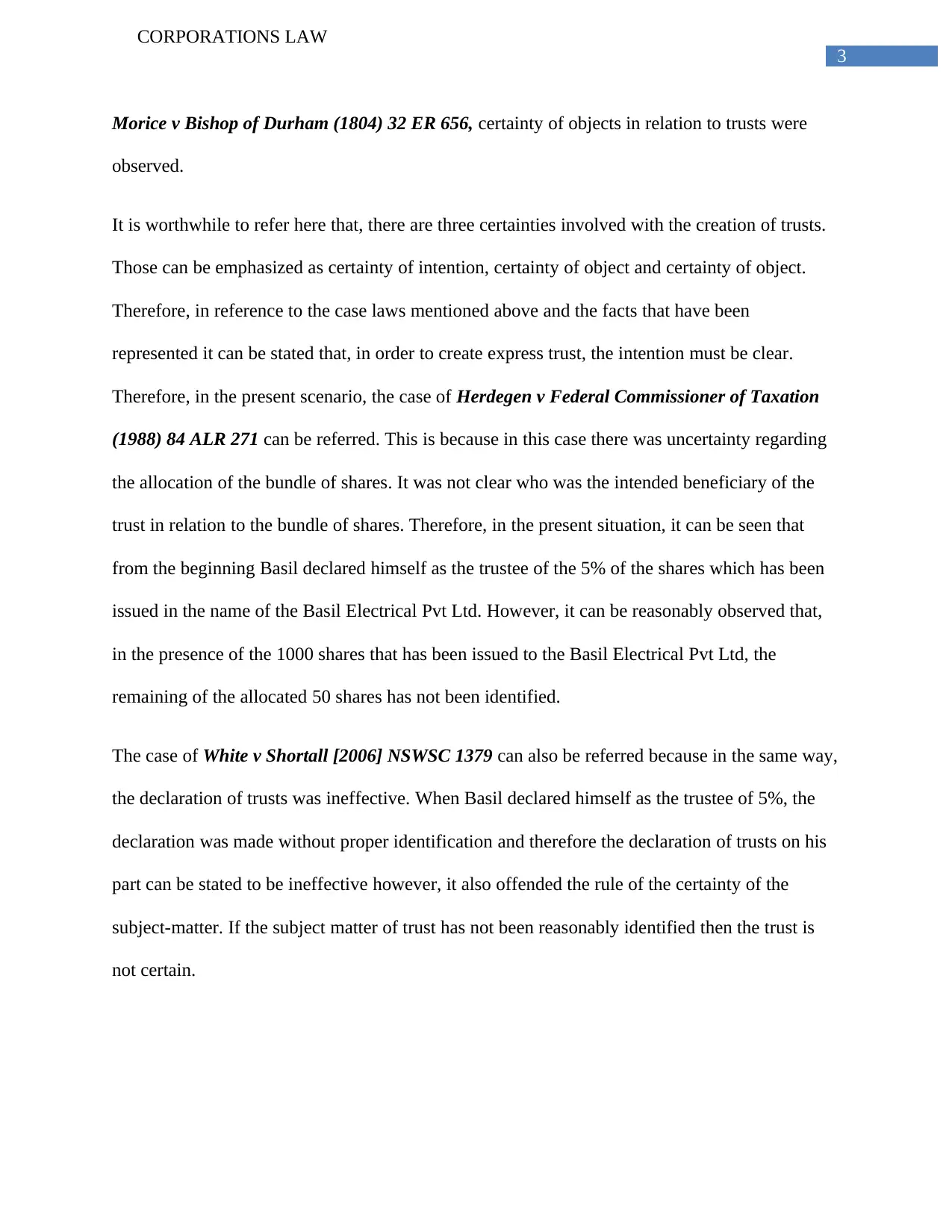
3
CORPORATIONS LAW
Morice v Bishop of Durham (1804) 32 ER 656, certainty of objects in relation to trusts were
observed.
It is worthwhile to refer here that, there are three certainties involved with the creation of trusts.
Those can be emphasized as certainty of intention, certainty of object and certainty of object.
Therefore, in reference to the case laws mentioned above and the facts that have been
represented it can be stated that, in order to create express trust, the intention must be clear.
Therefore, in the present scenario, the case of Herdegen v Federal Commissioner of Taxation
(1988) 84 ALR 271 can be referred. This is because in this case there was uncertainty regarding
the allocation of the bundle of shares. It was not clear who was the intended beneficiary of the
trust in relation to the bundle of shares. Therefore, in the present situation, it can be seen that
from the beginning Basil declared himself as the trustee of the 5% of the shares which has been
issued in the name of the Basil Electrical Pvt Ltd. However, it can be reasonably observed that,
in the presence of the 1000 shares that has been issued to the Basil Electrical Pvt Ltd, the
remaining of the allocated 50 shares has not been identified.
The case of White v Shortall [2006] NSWSC 1379 can also be referred because in the same way,
the declaration of trusts was ineffective. When Basil declared himself as the trustee of 5%, the
declaration was made without proper identification and therefore the declaration of trusts on his
part can be stated to be ineffective however, it also offended the rule of the certainty of the
subject-matter. If the subject matter of trust has not been reasonably identified then the trust is
not certain.
CORPORATIONS LAW
Morice v Bishop of Durham (1804) 32 ER 656, certainty of objects in relation to trusts were
observed.
It is worthwhile to refer here that, there are three certainties involved with the creation of trusts.
Those can be emphasized as certainty of intention, certainty of object and certainty of object.
Therefore, in reference to the case laws mentioned above and the facts that have been
represented it can be stated that, in order to create express trust, the intention must be clear.
Therefore, in the present scenario, the case of Herdegen v Federal Commissioner of Taxation
(1988) 84 ALR 271 can be referred. This is because in this case there was uncertainty regarding
the allocation of the bundle of shares. It was not clear who was the intended beneficiary of the
trust in relation to the bundle of shares. Therefore, in the present situation, it can be seen that
from the beginning Basil declared himself as the trustee of the 5% of the shares which has been
issued in the name of the Basil Electrical Pvt Ltd. However, it can be reasonably observed that,
in the presence of the 1000 shares that has been issued to the Basil Electrical Pvt Ltd, the
remaining of the allocated 50 shares has not been identified.
The case of White v Shortall [2006] NSWSC 1379 can also be referred because in the same way,
the declaration of trusts was ineffective. When Basil declared himself as the trustee of 5%, the
declaration was made without proper identification and therefore the declaration of trusts on his
part can be stated to be ineffective however, it also offended the rule of the certainty of the
subject-matter. If the subject matter of trust has not been reasonably identified then the trust is
not certain.
Paraphrase This Document
Need a fresh take? Get an instant paraphrase of this document with our AI Paraphraser
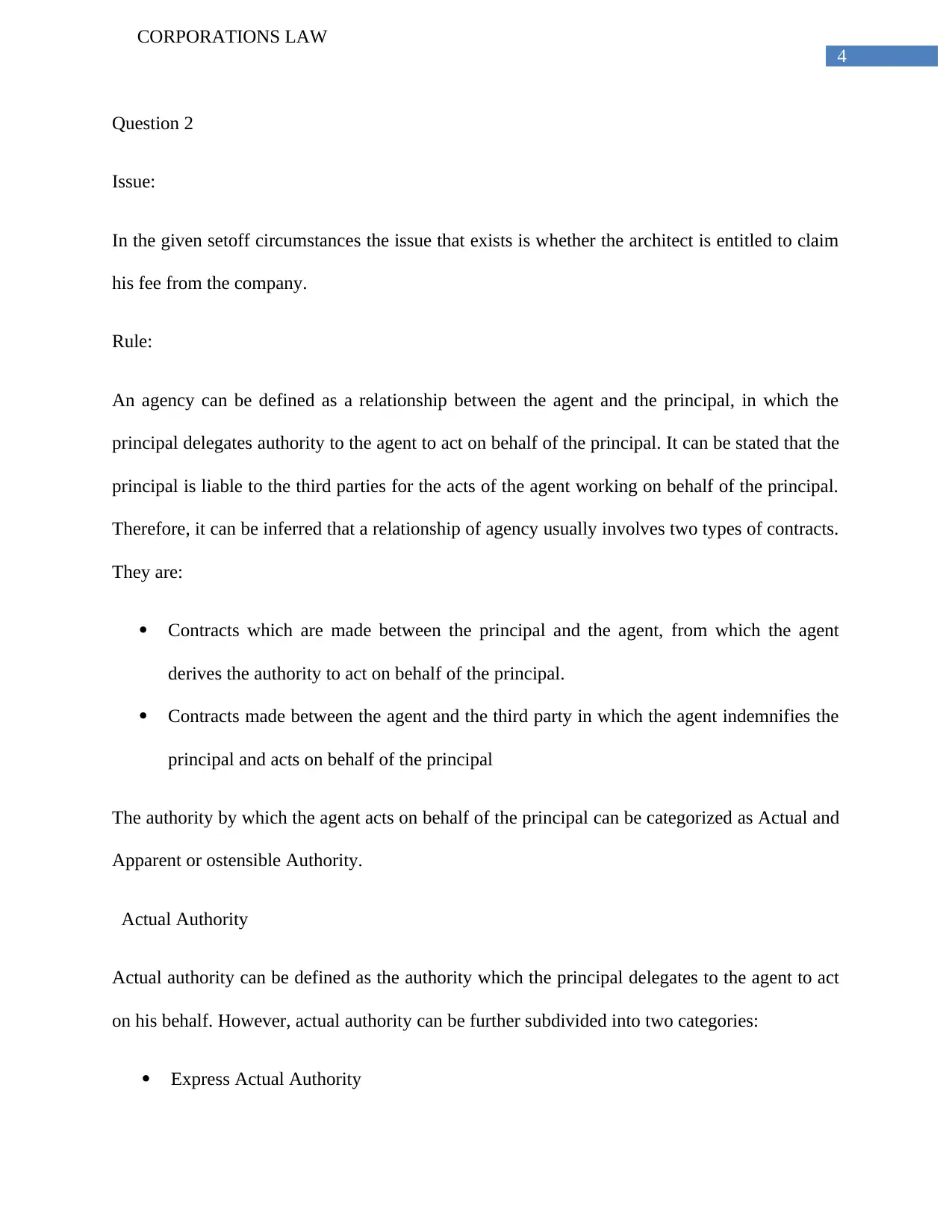
4
CORPORATIONS LAW
Question 2
Issue:
In the given setoff circumstances the issue that exists is whether the architect is entitled to claim
his fee from the company.
Rule:
An agency can be defined as a relationship between the agent and the principal, in which the
principal delegates authority to the agent to act on behalf of the principal. It can be stated that the
principal is liable to the third parties for the acts of the agent working on behalf of the principal.
Therefore, it can be inferred that a relationship of agency usually involves two types of contracts.
They are:
Contracts which are made between the principal and the agent, from which the agent
derives the authority to act on behalf of the principal.
Contracts made between the agent and the third party in which the agent indemnifies the
principal and acts on behalf of the principal
The authority by which the agent acts on behalf of the principal can be categorized as Actual and
Apparent or ostensible Authority.
Actual Authority
Actual authority can be defined as the authority which the principal delegates to the agent to act
on his behalf. However, actual authority can be further subdivided into two categories:
Express Actual Authority
CORPORATIONS LAW
Question 2
Issue:
In the given setoff circumstances the issue that exists is whether the architect is entitled to claim
his fee from the company.
Rule:
An agency can be defined as a relationship between the agent and the principal, in which the
principal delegates authority to the agent to act on behalf of the principal. It can be stated that the
principal is liable to the third parties for the acts of the agent working on behalf of the principal.
Therefore, it can be inferred that a relationship of agency usually involves two types of contracts.
They are:
Contracts which are made between the principal and the agent, from which the agent
derives the authority to act on behalf of the principal.
Contracts made between the agent and the third party in which the agent indemnifies the
principal and acts on behalf of the principal
The authority by which the agent acts on behalf of the principal can be categorized as Actual and
Apparent or ostensible Authority.
Actual Authority
Actual authority can be defined as the authority which the principal delegates to the agent to act
on his behalf. However, actual authority can be further subdivided into two categories:
Express Actual Authority
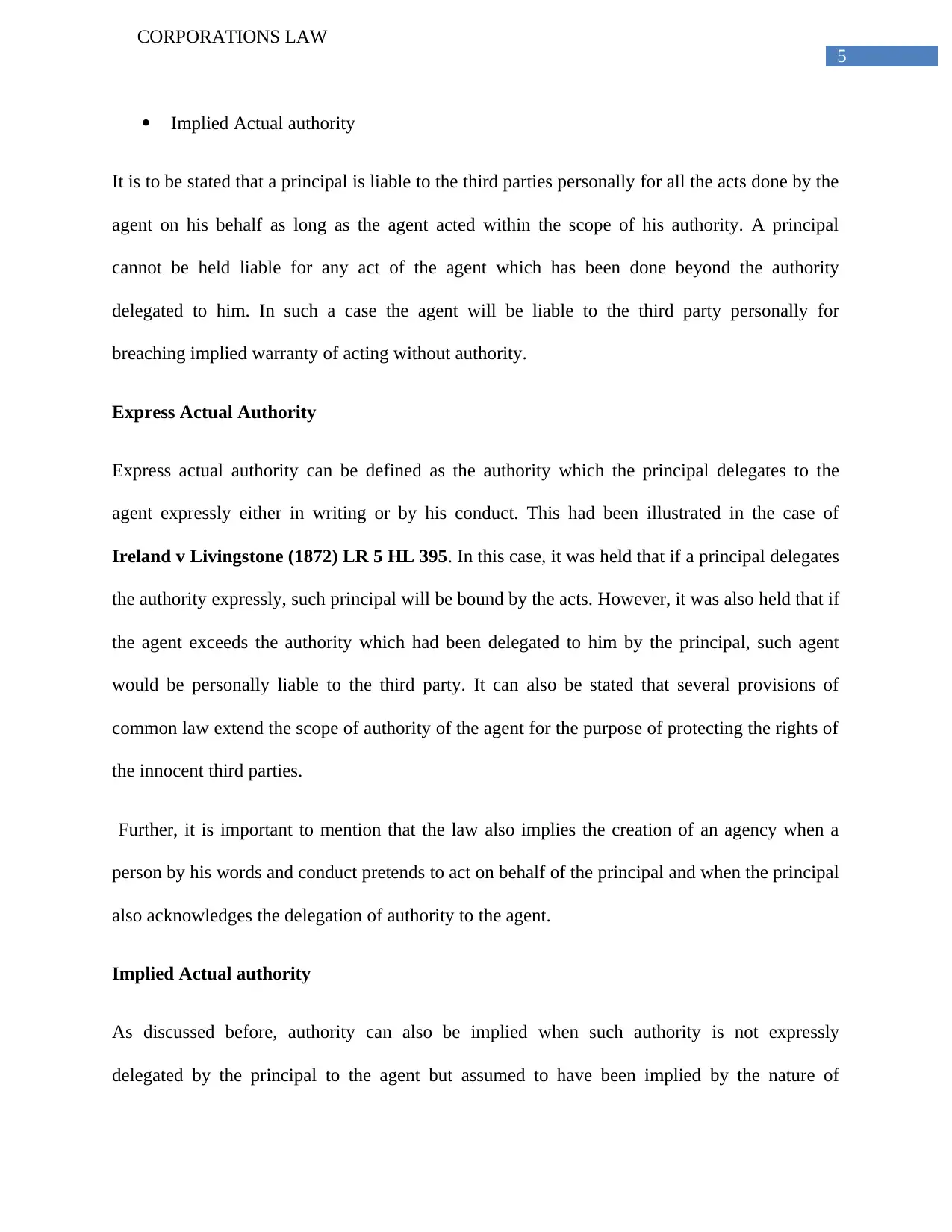
5
CORPORATIONS LAW
Implied Actual authority
It is to be stated that a principal is liable to the third parties personally for all the acts done by the
agent on his behalf as long as the agent acted within the scope of his authority. A principal
cannot be held liable for any act of the agent which has been done beyond the authority
delegated to him. In such a case the agent will be liable to the third party personally for
breaching implied warranty of acting without authority.
Express Actual Authority
Express actual authority can be defined as the authority which the principal delegates to the
agent expressly either in writing or by his conduct. This had been illustrated in the case of
Ireland v Livingstone (1872) LR 5 HL 395. In this case, it was held that if a principal delegates
the authority expressly, such principal will be bound by the acts. However, it was also held that if
the agent exceeds the authority which had been delegated to him by the principal, such agent
would be personally liable to the third party. It can also be stated that several provisions of
common law extend the scope of authority of the agent for the purpose of protecting the rights of
the innocent third parties.
Further, it is important to mention that the law also implies the creation of an agency when a
person by his words and conduct pretends to act on behalf of the principal and when the principal
also acknowledges the delegation of authority to the agent.
Implied Actual authority
As discussed before, authority can also be implied when such authority is not expressly
delegated by the principal to the agent but assumed to have been implied by the nature of
CORPORATIONS LAW
Implied Actual authority
It is to be stated that a principal is liable to the third parties personally for all the acts done by the
agent on his behalf as long as the agent acted within the scope of his authority. A principal
cannot be held liable for any act of the agent which has been done beyond the authority
delegated to him. In such a case the agent will be liable to the third party personally for
breaching implied warranty of acting without authority.
Express Actual Authority
Express actual authority can be defined as the authority which the principal delegates to the
agent expressly either in writing or by his conduct. This had been illustrated in the case of
Ireland v Livingstone (1872) LR 5 HL 395. In this case, it was held that if a principal delegates
the authority expressly, such principal will be bound by the acts. However, it was also held that if
the agent exceeds the authority which had been delegated to him by the principal, such agent
would be personally liable to the third party. It can also be stated that several provisions of
common law extend the scope of authority of the agent for the purpose of protecting the rights of
the innocent third parties.
Further, it is important to mention that the law also implies the creation of an agency when a
person by his words and conduct pretends to act on behalf of the principal and when the principal
also acknowledges the delegation of authority to the agent.
Implied Actual authority
As discussed before, authority can also be implied when such authority is not expressly
delegated by the principal to the agent but assumed to have been implied by the nature of
⊘ This is a preview!⊘
Do you want full access?
Subscribe today to unlock all pages.

Trusted by 1+ million students worldwide
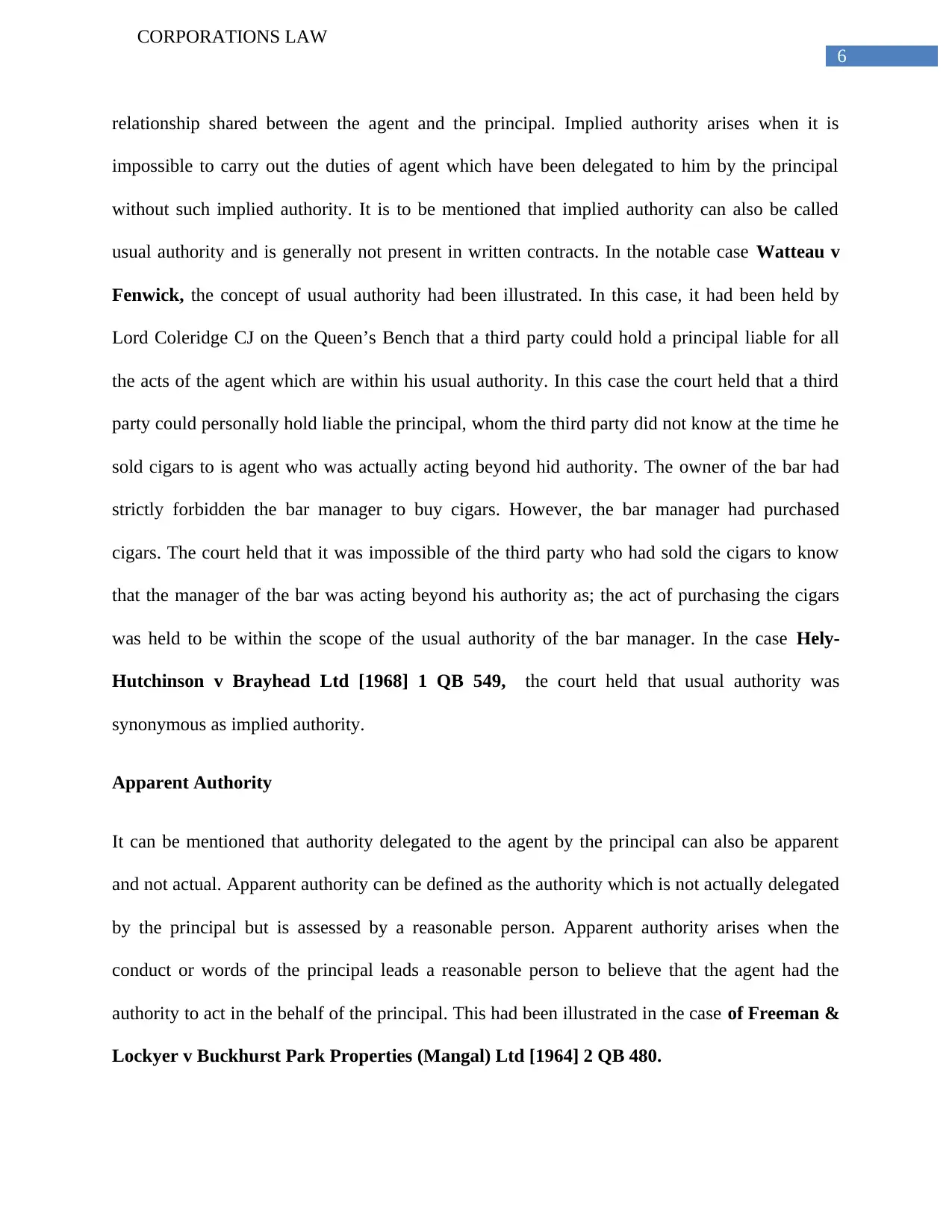
6
CORPORATIONS LAW
relationship shared between the agent and the principal. Implied authority arises when it is
impossible to carry out the duties of agent which have been delegated to him by the principal
without such implied authority. It is to be mentioned that implied authority can also be called
usual authority and is generally not present in written contracts. In the notable case Watteau v
Fenwick, the concept of usual authority had been illustrated. In this case, it had been held by
Lord Coleridge CJ on the Queen’s Bench that a third party could hold a principal liable for all
the acts of the agent which are within his usual authority. In this case the court held that a third
party could personally hold liable the principal, whom the third party did not know at the time he
sold cigars to is agent who was actually acting beyond hid authority. The owner of the bar had
strictly forbidden the bar manager to buy cigars. However, the bar manager had purchased
cigars. The court held that it was impossible of the third party who had sold the cigars to know
that the manager of the bar was acting beyond his authority as; the act of purchasing the cigars
was held to be within the scope of the usual authority of the bar manager. In the case Hely-
Hutchinson v Brayhead Ltd [1968] 1 QB 549, the court held that usual authority was
synonymous as implied authority.
Apparent Authority
It can be mentioned that authority delegated to the agent by the principal can also be apparent
and not actual. Apparent authority can be defined as the authority which is not actually delegated
by the principal but is assessed by a reasonable person. Apparent authority arises when the
conduct or words of the principal leads a reasonable person to believe that the agent had the
authority to act in the behalf of the principal. This had been illustrated in the case of Freeman &
Lockyer v Buckhurst Park Properties (Mangal) Ltd [1964] 2 QB 480.
CORPORATIONS LAW
relationship shared between the agent and the principal. Implied authority arises when it is
impossible to carry out the duties of agent which have been delegated to him by the principal
without such implied authority. It is to be mentioned that implied authority can also be called
usual authority and is generally not present in written contracts. In the notable case Watteau v
Fenwick, the concept of usual authority had been illustrated. In this case, it had been held by
Lord Coleridge CJ on the Queen’s Bench that a third party could hold a principal liable for all
the acts of the agent which are within his usual authority. In this case the court held that a third
party could personally hold liable the principal, whom the third party did not know at the time he
sold cigars to is agent who was actually acting beyond hid authority. The owner of the bar had
strictly forbidden the bar manager to buy cigars. However, the bar manager had purchased
cigars. The court held that it was impossible of the third party who had sold the cigars to know
that the manager of the bar was acting beyond his authority as; the act of purchasing the cigars
was held to be within the scope of the usual authority of the bar manager. In the case Hely-
Hutchinson v Brayhead Ltd [1968] 1 QB 549, the court held that usual authority was
synonymous as implied authority.
Apparent Authority
It can be mentioned that authority delegated to the agent by the principal can also be apparent
and not actual. Apparent authority can be defined as the authority which is not actually delegated
by the principal but is assessed by a reasonable person. Apparent authority arises when the
conduct or words of the principal leads a reasonable person to believe that the agent had the
authority to act in the behalf of the principal. This had been illustrated in the case of Freeman &
Lockyer v Buckhurst Park Properties (Mangal) Ltd [1964] 2 QB 480.
Paraphrase This Document
Need a fresh take? Get an instant paraphrase of this document with our AI Paraphraser
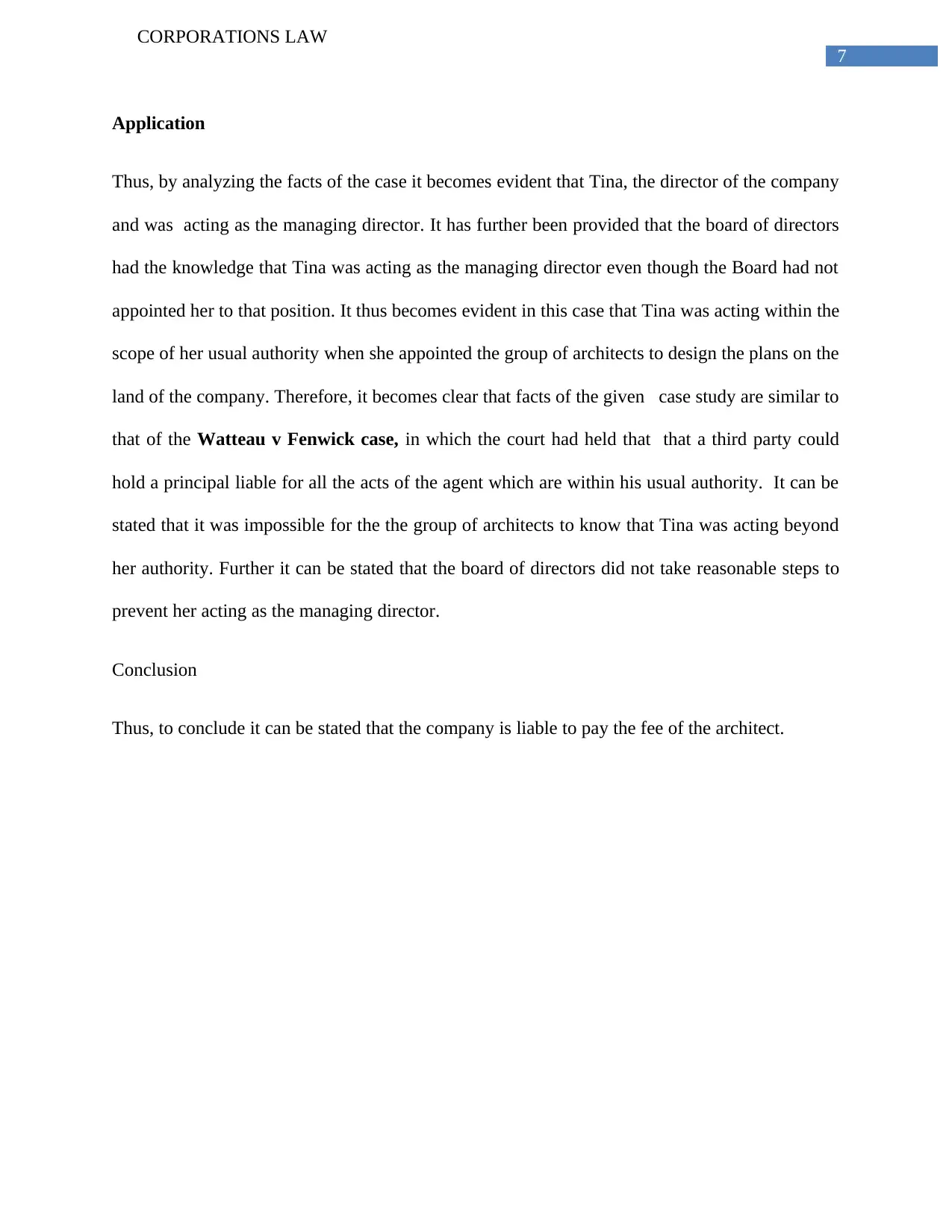
7
CORPORATIONS LAW
Application
Thus, by analyzing the facts of the case it becomes evident that Tina, the director of the company
and was acting as the managing director. It has further been provided that the board of directors
had the knowledge that Tina was acting as the managing director even though the Board had not
appointed her to that position. It thus becomes evident in this case that Tina was acting within the
scope of her usual authority when she appointed the group of architects to design the plans on the
land of the company. Therefore, it becomes clear that facts of the given case study are similar to
that of the Watteau v Fenwick case, in which the court had held that that a third party could
hold a principal liable for all the acts of the agent which are within his usual authority. It can be
stated that it was impossible for the the group of architects to know that Tina was acting beyond
her authority. Further it can be stated that the board of directors did not take reasonable steps to
prevent her acting as the managing director.
Conclusion
Thus, to conclude it can be stated that the company is liable to pay the fee of the architect.
CORPORATIONS LAW
Application
Thus, by analyzing the facts of the case it becomes evident that Tina, the director of the company
and was acting as the managing director. It has further been provided that the board of directors
had the knowledge that Tina was acting as the managing director even though the Board had not
appointed her to that position. It thus becomes evident in this case that Tina was acting within the
scope of her usual authority when she appointed the group of architects to design the plans on the
land of the company. Therefore, it becomes clear that facts of the given case study are similar to
that of the Watteau v Fenwick case, in which the court had held that that a third party could
hold a principal liable for all the acts of the agent which are within his usual authority. It can be
stated that it was impossible for the the group of architects to know that Tina was acting beyond
her authority. Further it can be stated that the board of directors did not take reasonable steps to
prevent her acting as the managing director.
Conclusion
Thus, to conclude it can be stated that the company is liable to pay the fee of the architect.
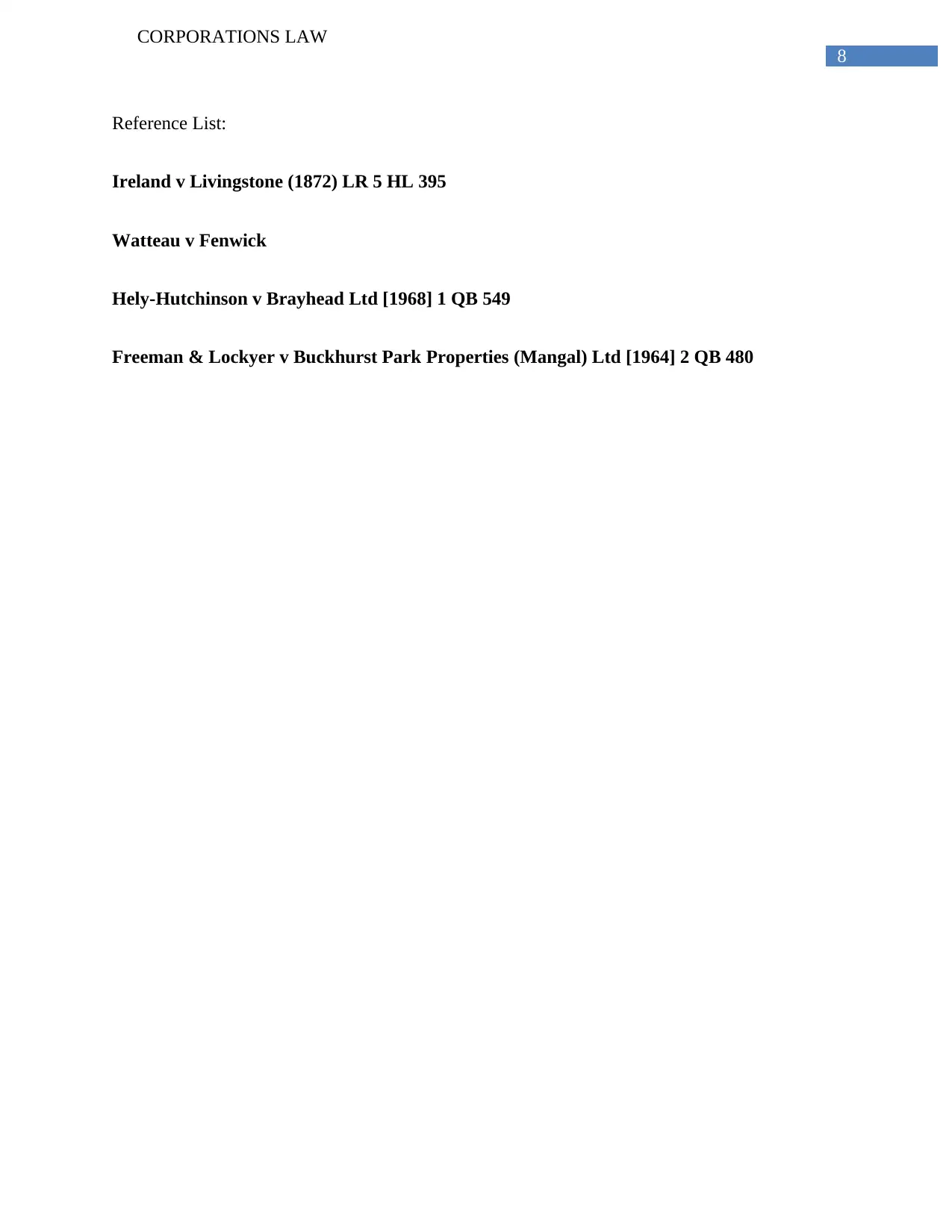
8
CORPORATIONS LAW
Reference List:
Ireland v Livingstone (1872) LR 5 HL 395
Watteau v Fenwick
Hely-Hutchinson v Brayhead Ltd [1968] 1 QB 549
Freeman & Lockyer v Buckhurst Park Properties (Mangal) Ltd [1964] 2 QB 480
CORPORATIONS LAW
Reference List:
Ireland v Livingstone (1872) LR 5 HL 395
Watteau v Fenwick
Hely-Hutchinson v Brayhead Ltd [1968] 1 QB 549
Freeman & Lockyer v Buckhurst Park Properties (Mangal) Ltd [1964] 2 QB 480
⊘ This is a preview!⊘
Do you want full access?
Subscribe today to unlock all pages.

Trusted by 1+ million students worldwide
1 out of 9
Related Documents
Your All-in-One AI-Powered Toolkit for Academic Success.
+13062052269
info@desklib.com
Available 24*7 on WhatsApp / Email
![[object Object]](/_next/static/media/star-bottom.7253800d.svg)
Unlock your academic potential
Copyright © 2020–2025 A2Z Services. All Rights Reserved. Developed and managed by ZUCOL.




